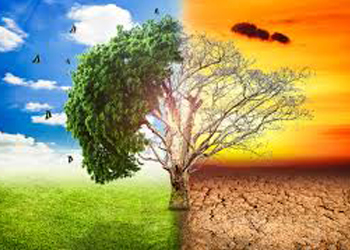Almost everything in the world existing in time undergoes changes. Some changes are very slow and minute whilst others are fast and radical. The former is not noticeable easily while the later are not only noticeable but also are threatening, shocking, as we normally prefer stability. Religion is no exception to this general rule. Every religion undergoes slow, minute changes depending upon the changes in natural environment, socio-economic and political changes. But every change or transformation is neither deliberate nor intended nor is it for the better. On the contrary, the general tendency of everything that has origin or birth is to go through stages of growth, that is, childhood, youth old age and death. These changes are natural, inevitable but not always desired or regarded as desirable-especially the stages of sickness, decay and death are the ones, which humans try to avoid, try to shun. Humans, however, try to preserve freshness, youth, and energy and avoid weakness, deterioration, and decay. Such efforts to preserve vitality and to avoid deterioration and decay are deliberate, intended and planned. This is true of all social institutions like state (political), industry (economic), communications, trade, science and technology. This is equally true of religious institutions or organized religions. Thus, Vedic religion, which started with performance of sacrifice, has undergone drastic changes through ages. Old gods were replaced by new pauranic gods; sacrifices, fire and vedi were substituted by temples and idol worship.
 However, it is very difficult for us to accurately or even approximately conceive religious life of Indus valley civilization of the Vedic people or religious life at the time of Mahavira and Buddha. Religion as an integral part of human civilization and culture is bound to change with the changes in culture. Yet normally human beings resist changes especially in religious sphere. They justify this resistance by distinguishing the eternal, transcendent, unchanging truth of religion and the changing empirical non-eternal truth of the worldly life. We find such a distinction between para-vidya (higher wisdom) and apara-vidya (lower knowledge) in the Upanishads. The former is almost the immutable reality and the latter about the mutable world. God and soul being eternal, immutable, transcendent are beyond the ever-changing spatio-temporal worldly existence. They are known only through revelation, not by any ordinary person however rational he may be. They are known by a prophet, by a mystic through supra – rational, supra – sensuous experience. There are some changes which are natural, e.g. a tree is born, it grows, becomes old and dies; the law of nature governs. These changes are biological, which are applicable to all living creature There are other situations, like birth in a particular linguistic family, a particular religion, which shapes the mind of human beings. These changes are brought out either by parents, teachers-academics or spiritual, friends etc. These changes affect the whole society. No individual can live in isolation. He or she is the part of the wider society governed by legal, moral, religious and spiritual laws.When the society transforms, it undergoes transformation due to natural, phenomenal, or political upheavals or economic and other social changes. Religion is also not excluded from the process of change. Some natural geographical and social changes take place thereby leading to change in religions as pertaining to external conduct. There are some areas where there are deliberate attempts to bring about the revival in the spirit of religion. Such a deliberate attempt presupposes that the present condition in religion relating to the very intrinsic spirit and essence of religion is deteriorating. It is also presupposed that the earlier times were good, and present are not, and therefore arose a need for reform.
However, it is very difficult for us to accurately or even approximately conceive religious life of Indus valley civilization of the Vedic people or religious life at the time of Mahavira and Buddha. Religion as an integral part of human civilization and culture is bound to change with the changes in culture. Yet normally human beings resist changes especially in religious sphere. They justify this resistance by distinguishing the eternal, transcendent, unchanging truth of religion and the changing empirical non-eternal truth of the worldly life. We find such a distinction between para-vidya (higher wisdom) and apara-vidya (lower knowledge) in the Upanishads. The former is almost the immutable reality and the latter about the mutable world. God and soul being eternal, immutable, transcendent are beyond the ever-changing spatio-temporal worldly existence. They are known only through revelation, not by any ordinary person however rational he may be. They are known by a prophet, by a mystic through supra – rational, supra – sensuous experience. There are some changes which are natural, e.g. a tree is born, it grows, becomes old and dies; the law of nature governs. These changes are biological, which are applicable to all living creature There are other situations, like birth in a particular linguistic family, a particular religion, which shapes the mind of human beings. These changes are brought out either by parents, teachers-academics or spiritual, friends etc. These changes affect the whole society. No individual can live in isolation. He or she is the part of the wider society governed by legal, moral, religious and spiritual laws.When the society transforms, it undergoes transformation due to natural, phenomenal, or political upheavals or economic and other social changes. Religion is also not excluded from the process of change. Some natural geographical and social changes take place thereby leading to change in religions as pertaining to external conduct. There are some areas where there are deliberate attempts to bring about the revival in the spirit of religion. Such a deliberate attempt presupposes that the present condition in religion relating to the very intrinsic spirit and essence of religion is deteriorating. It is also presupposed that the earlier times were good, and present are not, and therefore arose a need for reform.
 ‘Reform’ means ‘change for the better’ and it is brought about intentionally, deliberately and knowingly by religious leaders with a view to keep up the spirit of religion and to adjust the outward / external aspects to the (spatio-temporal)) historical, natural, socio – political and cultural changes. According to Jaina philosophy reality is neither exclusively static and unchanging (kutasthanitya) nor exclusively a flux (anitya, ksanika) but is both permanent from the point of view of substance and changing from the point of view of modes (paryayas),that is it is PARINAMI NITYA. It follows from this view that we must not hold any one-sided view about the nature of reality and must adopt the view that reality is many-sided- Anekanta. Each view should be treated as partial (a naya) and true from a certain perspective. This is true of ‘dharma’ also. From one point of view, dharma is eternal and unchanging but from the point of view of modes, it is changing. The Jaina doctrine of Anekanta and naya helps to avoid conflict and confrontation between different perspectives. Secondly the Jaina view that we must always think of everything relative to dravya, ksetra, kala and bhava, provides the sound logico-philosophical foundation for religious reform. Those who refuse to change are not really faithful to their own philosophy. Finally, the true understanding of the unique theories of Anekanta and Naya make Jaina religion not only non-aggressive and non-dogmatic but help to develop the spiritual attitude of Sarva-dharma-samabhavana and respect for all religions. In order to understand what is meant by philosophical basis of religious reform, we will have to distinguish between different theoretical disciplines, which deal with religious phenomena such as history of religion, psychology of religion, sociology of religion. All these three disciplines deal with religion. Nevertheless, their perspectives are different. However, they all agree as far as the nature and method of their enquiry is empirical. They all are factual sciences. On the contrary, philosophical enquiry is not an empirical and a factual enquiry but it is both a conceptual or logical and also normative enquiry.
‘Reform’ means ‘change for the better’ and it is brought about intentionally, deliberately and knowingly by religious leaders with a view to keep up the spirit of religion and to adjust the outward / external aspects to the (spatio-temporal)) historical, natural, socio – political and cultural changes. According to Jaina philosophy reality is neither exclusively static and unchanging (kutasthanitya) nor exclusively a flux (anitya, ksanika) but is both permanent from the point of view of substance and changing from the point of view of modes (paryayas),that is it is PARINAMI NITYA. It follows from this view that we must not hold any one-sided view about the nature of reality and must adopt the view that reality is many-sided- Anekanta. Each view should be treated as partial (a naya) and true from a certain perspective. This is true of ‘dharma’ also. From one point of view, dharma is eternal and unchanging but from the point of view of modes, it is changing. The Jaina doctrine of Anekanta and naya helps to avoid conflict and confrontation between different perspectives. Secondly the Jaina view that we must always think of everything relative to dravya, ksetra, kala and bhava, provides the sound logico-philosophical foundation for religious reform. Those who refuse to change are not really faithful to their own philosophy. Finally, the true understanding of the unique theories of Anekanta and Naya make Jaina religion not only non-aggressive and non-dogmatic but help to develop the spiritual attitude of Sarva-dharma-samabhavana and respect for all religions. In order to understand what is meant by philosophical basis of religious reform, we will have to distinguish between different theoretical disciplines, which deal with religious phenomena such as history of religion, psychology of religion, sociology of religion. All these three disciplines deal with religion. Nevertheless, their perspectives are different. However, they all agree as far as the nature and method of their enquiry is empirical. They all are factual sciences. On the contrary, philosophical enquiry is not an empirical and a factual enquiry but it is both a conceptual or logical and also normative enquiry.
 While empirical enquiry provides causal explanations of religious phenomena, philosophical enquiry provides reasons or arguments, justifying validity or otherwise of certain change in belief system or practice. Here one can raise the question of future of religion and future religion. Is the agamic Jainism found today with its pure form today? Is this question a valid question this is to demand that the thing will remain intact for 2500 years? Demand to find Jainism in pure form is not a wise demand. This has happened in every religion inevitable in the world, as change is the inevitable phenomenon in the life. Religion is also bound to change. However, on the other hand there is a very strong argument making distinction between principles and practices of religion and showing the permanence of principles and mutability of the practices. In the dominant view, morality is more rational and universal than, and therefore independent from religion. Today’s youth have a different emerging morality. Legality becomes more important than moral principles. Individual rights are gaining importance. Believers do not have exclusive moral knowledge. Moral principles can be known by anyone. Morality, not religion, is the supreme judge of human actions in the world. The advantages of such a view for thinking about a common global morality are clear. Furthermore, every morality is influenced by metaphysical and anthropological assumptions – whether or not religious: the so-called modern, rational, secular morality. The central moral question in the alternative narrative concept of morality is ‘Who am I / who do I want to be?’ and not ‘What is the right action?’ In this approach, not universal principles, but tradition-dependant stories constitute the core of a morality. Are these concepts more adequate for understanding the relation of religion to morality? Do they have room for the project of a universal morality of human rights?
While empirical enquiry provides causal explanations of religious phenomena, philosophical enquiry provides reasons or arguments, justifying validity or otherwise of certain change in belief system or practice. Here one can raise the question of future of religion and future religion. Is the agamic Jainism found today with its pure form today? Is this question a valid question this is to demand that the thing will remain intact for 2500 years? Demand to find Jainism in pure form is not a wise demand. This has happened in every religion inevitable in the world, as change is the inevitable phenomenon in the life. Religion is also bound to change. However, on the other hand there is a very strong argument making distinction between principles and practices of religion and showing the permanence of principles and mutability of the practices. In the dominant view, morality is more rational and universal than, and therefore independent from religion. Today’s youth have a different emerging morality. Legality becomes more important than moral principles. Individual rights are gaining importance. Believers do not have exclusive moral knowledge. Moral principles can be known by anyone. Morality, not religion, is the supreme judge of human actions in the world. The advantages of such a view for thinking about a common global morality are clear. Furthermore, every morality is influenced by metaphysical and anthropological assumptions – whether or not religious: the so-called modern, rational, secular morality. The central moral question in the alternative narrative concept of morality is ‘Who am I / who do I want to be?’ and not ‘What is the right action?’ In this approach, not universal principles, but tradition-dependant stories constitute the core of a morality. Are these concepts more adequate for understanding the relation of religion to morality? Do they have room for the project of a universal morality of human rights?
The nature of Jaina religion in the 20th century is a combination of old and new values and this is the future. In the sway of time, people may not know the original form of religion. It is a dilemma. If they do not change, it would be a dead religion and if they accept the change, it will lose its original shramanic identity. Accepting or rejecting change will determine future of Jaina religion. As no consensus about the essential orientation of human nature. Instead, there seem to be many views. To put the matter at its simplest, there are some who believe, at one end of the spectrum, that we are by nature fundamentally violent, aggressive, and competitive; while others, at the other end, take the view that we are predominantly disposed toward gentleness and love. Most perspectives lie between these extremes, accommodating all of our qualities and propensities in varying degrees. Generally speaking, if we view human nature as dominated by destructive tendencies, our ethics will most likely be grounded in something outside ourselves. We will understand ethics as a means for keeping those destructive tendencies in check in the name of some greater good. If, however, we view human nature as predominantly oriented toward kindness and the desire for a peaceful life, then we can consider ethics an entirely natural and rational means for pursuing our innate potential. On this understanding, ethics consists less of rules to be obeyed than of principles for inner self-regulation to promote those aspects of our nature, which we recognize as conducive to our own well-being, and that of others.

